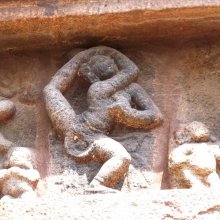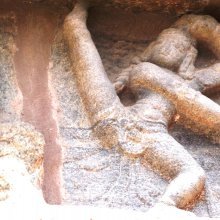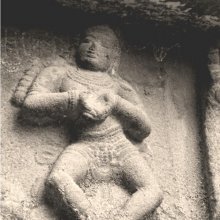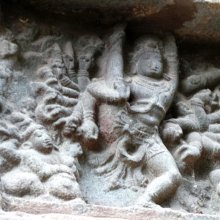Quick, Quickly: 3 definitions
Introduction:
Quick means something in Buddhism, Pali, Hinduism, Sanskrit. If you want to know the exact meaning, history, etymology or English translation of this term then check out the descriptions on this page. Add your comment or reference to a book if you want to contribute to this summary article.
Images (photo gallery)
In Hinduism
Natyashastra (theatrics and dramaturgy)
Source: Shodhganga: Elements of Art and Architecture in the Trtiyakhanda of the Visnudharmottarapurana (natya)The Quick Gait is denoted by the Sanskrit word Śīghra, which represents one of the various Gatis (“way of walking”) (in Indian Dramas), according to the Viṣṇudharmottarapurāṇa, an ancient Sanskrit text which (being encyclopedic in nature) deals with a variety of cultural topics such as arts, architecture, music, grammar and astronomy.—Śīghragati or quick gait should be adopted in fear, terror, anger, joy, rapid and urgent actions, on hearing distasteful information, on seeing unbelievable things, searching of crime factors etc. In the Mṛcchakaṭika of Śudraka, the heroin Vasantasenā was moving speedily in terror as she was followed by some cunning persons like Vīṭa, Ceṭa and Śakāra and her gait was crossing over the speed of wind. This can be taken as a manifestation of śīghra-gati.

Natyashastra (नाट्यशास्त्र, nāṭyaśāstra) refers to both the ancient Indian tradition (shastra) of performing arts, (natya—theatrics, drama, dance, music), as well as the name of a Sanskrit work dealing with these subjects. It also teaches the rules for composing Dramatic plays (nataka), construction and performance of Theater, and Poetic works (kavya).
Yoga (school of philosophy)
Source: ORA: Amanaska (king of all yogas): A Critical Edition and Annotated Translation by Jason Birch(That which is) Quickly (overcome) is denoted by the Sanskrit term Kṣipra, according to the Haṭhapradīpikā of Svātmārāma: an influential 15th-century Sanskrit manual on Hatha-Yoga dealing with techniques to channel one’s vital energy.—Accordingly, while discussing methods for conquering the mind: “Acquiring spiritual knowledge, associating with the wise, abandoning habitual tendencies and stopping the movement of the breath; according to tradition, [all] these methods are effective in conquering the mind. The [mind] is quickly (kṣipra) overcome by these [methods of restraint] like the dust of the earth by streams [of water]”.

Yoga is originally considered a branch of Hindu philosophy (astika), but both ancient and modern Yoga combine the physical, mental and spiritual. Yoga teaches various physical techniques also known as āsanas (postures), used for various purposes (eg., meditation, contemplation, relaxation).
In Buddhism
Tibetan Buddhism (Vajrayana or tantric Buddhism)
Source: ORA: Amanaska (king of all yogas): (Tibetan Buddhism)Quickly (gaining control) (over Gods, Demons and Men) is denoted by the Sanskrit term Kṣipra, according to verse 14.24bd-27 of the Laghuśaṃvara, an ancient Buddhist Yoginī Tantra.—Accordingly: “The Sādhaka [who has] the Siddhi of speech can certainly attract a king or queen by [merely] thinking [it]. He quickly (kṣipra) controls gods, demons and men. When angry, he can kill with his speech and drive away his adversary. The practitioner can thus effect a curse with his speech [...]”.

Tibetan Buddhism includes schools such as Nyingma, Kadampa, Kagyu and Gelug. Their primary canon of literature is divided in two broad categories: The Kangyur, which consists of Buddha’s words, and the Tengyur, which includes commentaries from various sources. Esotericism and tantra techniques (vajrayāna) are collected indepently.
See also (Relevant definitions)
Starts with: Quick grass, Quick poison, Quick stick, Quick thorn, Quicksilver-weed, Quickthorn.
Ends with: Seaside quick.
Full-text (+2211): Kshipra, Shighra, Tvarita, Satvara, Druta, Asu, Apralamba, Turna, Laghuvikrama, Javin, Sarabhasa, Syandana, Turta, Jaladi, Kshepiyas, Java, Mankshu, Lahu, Sattvara, Kshepishtha.
Relevant text
Search found 373 books and stories containing Quick, Quickly; (plurals include: Quicks, Quicklies). You can also click to the full overview containing English textual excerpts. Below are direct links for the most relevant articles:
Yoga-sutras (Ancient and Modern Interpretations) (by Makarand Gopal Newalkar)
Sūtra 1.21 < [Book I - Samādhi-pāda]
Sūtra 1.1 [Definition of Yoga] < [Book I - Samādhi-pāda]
Sūtra 4.4 [Nirmāṇacitta—Artificial Minds] < [Book IV - Kaivalya-pāda]
The Tattvasangraha [with commentary] (by Ganganatha Jha)
Verse 1250-1253 < [Chapter 17 - Examination of the Definition of Sense-perception]
Verse 2523 < [Chapter 24b - Arguments against the reliability of the Veda (the Revealed Word)]
Verse 723-726 < [Chapter 13 - Examination of Sāmānya (the ‘universal’)]
Rasa Jala Nidhi, vol 2: Minerals (uparasa) (by Bhudeb Mookerjee)
Part 1 - Characteristics of Kankustha (an ore containing tin) < [Chapter XV - Uparasa (16): Kankustha (an ore containing tin)]
Part 1 - Characteristics of Chapala (rare type of ore) < [Chapter VI - Uparasa (7): Chapala (rare type of ore)]
Part 3 - How to take kasisa < [Chapter X - Uparasa (11): Kasisa (sulphate of iron)]
Vipassana Meditation (by Chanmyay Sayadaw)
Part 8 - Noting Mental And Emotional States < [Appendix One]
Part 3 - Mindfulness Of Mental And Emotional States < [Chapter 2 - Preliminary Instructions For Meditators]
Part 4 - Sitting Meditation < [Appendix One]
Hiranyakesi-grihya-sutra (by Hermann Oldenberg)
Yoga-sutras (with Bhoja’s Rajamartanda) (by Rajendralala Mitra)
Sūtra 1.21 < [First Chapter (Samadhi Pada)]
Sūtra 3.22 < [Third Chapter (Vibhuti Pada)]
Sūtra 1.22 < [First Chapter (Samadhi Pada)]
Related products
(+29 more products available)










